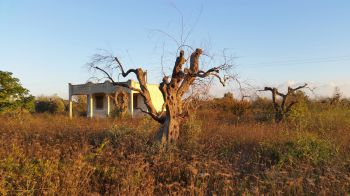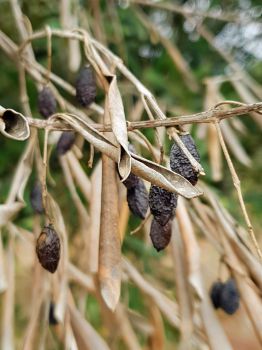Sussex academic joins UK-wide consortium to combat serious threat to plant health
By: Stephanie Allen
Last updated: Friday, 7 December 2018

Photo by Dr Steven White, Centre for Ecology & Hydrology (www.ceh.ac.uk/staff/steven-white)

Photo by Dr Steven White from the Centre for Ecology & Hydrology
A Reader in Ecology at the University of Sussex is to join a major UK-wide research programme into bacterial plant diseases.
Dr Alan Stewart will join scientists from across a spectrum of biological and social sciences to form BRIGIT, a consortium co-ordinated by the John Innes Centre which will work to prepare for the possible introduction and spread of the devastating plant pathogen Xylella fastidiosa into the UK.
Dr Stewart said: “Xyella is known to be transmitted from plant to plant by the common froghopper Philaenus spumarius, and possibly 20 other related insect species which feed on the xylem tissues that transport water from the roots up to the stems and leaves.
“This is one of the commonest insects across most of northern Europe, feeding on a very wide range of plant species. If the Xyella bacterium were to arrive in Britain and spread, it could be devastating for farming, forestry, horticulture and biodiversity.
“Our work at Sussex will focus on understanding the geographical distribution of these species in Britain, what plants they feed on and how they spread, encouraging citizen scientists to submit records to us from across the country.”
The BRIGIT consortium is the first phase in a major bacterial plant diseases research programme, for which funding was today (7 December) announced by the Parliamentary Under-Secretary of State, the Right Honourable Lord Henley.
Supported by the UK Research and Innovation’s Strategic Priorities Fund, the programme is a £17.7m collaboration between UK Research and Innovation Councils, the Biotechnology and Biological Sciences Research Council (BBSRC) and the Natural Environment Research Council (NERC) - together with the Department for Environment, Food and Rural Affairs (Defra) and the Scottish Government, who are providing £1.1m of additional funding.
Professor Nicola Spence, Chief Plant Health Officer and Deputy Director for plant and bee health at Defra, said: “I am delighted that UKRI, together with co-funders Defra and the Scottish Government, has agreed to fund this crucial research which will help us to better control bacterial plant diseases in the future.
“Protecting the UK’s plants from pests and diseases remains one of my Department’s highest priorities, and we need robust science to underpin our actions to combat these threats.
“Xylella fastidiosa is one such bacterial disease and will form the focus of the first phase of the research programme. The knowledge gained through this programme should assist us in further optimising our ongoing surveillance and ensure that our contingency plans are underpinned by the most up-to-date evidence available.”
Xylella has been described by the European Commission as “one of the most dangerous plant bacteria worldwide”. This insect-transmitted bacterial plant pathogen infects 500 species including crops, ornamental plants, and trees.
In Italy alone, over one million olive trees are dying from Xylella in a disease called Olive Quick Decline Syndrome. So far, Xylella has not been reported in the UK.
Professor Saskia Hogenhout, project leader at the John Innes Centre and principal investigator of BRIGIT, says: “We believe this consortium is much-needed, bringing a joined-up approach to tackle a potentially devastating plant disease.”
The ten institutions in the BRIGIT consortium are: John Innes Centre, Amgueddfa Cymru-National Museum Wales (NMU), Centre for Ecology & Hydrology, Fera Science Ltd, Forest Research, Royal Horticultural Society, Science and Advice for Scottish Agriculture, The University of Salford, The University of Stirling and the University of Sussex.
The consortium will collaborate with international scientists and organizations, including the University of Lisbon on further characterization of the insect vector.
Find out more about BRIGIT.
